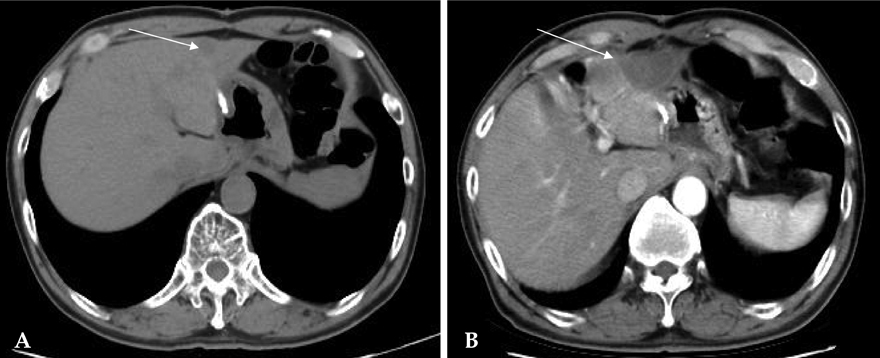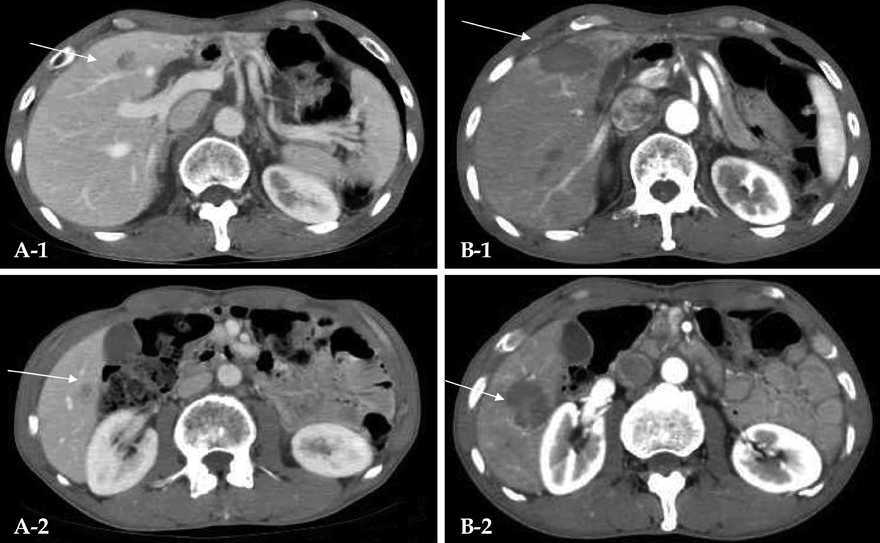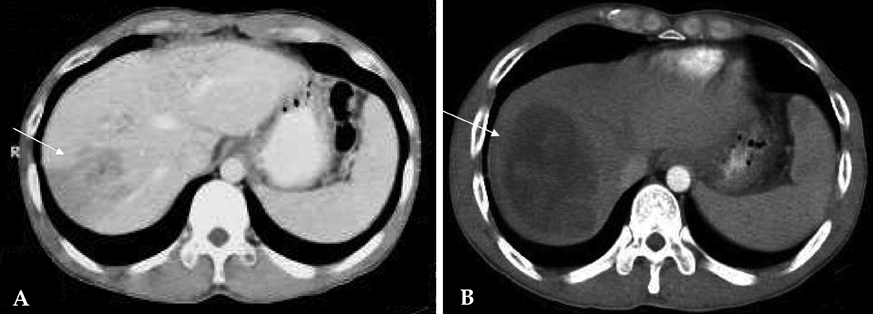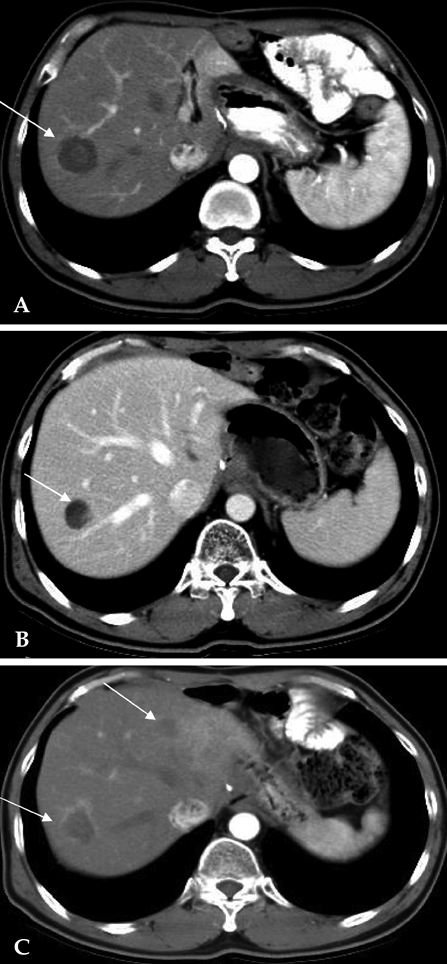Yonsei Med J.
2008 Dec;49(6):1046-1051. 10.3349/ymj.2008.49.6.1046.
Radiofrequency Ablation for Hepatic Metastasis from Gastric Adenocarcinoma
- Affiliations
-
- 1Department of Surgery, Samsung Medical Center, Sungkyunkwan University School of Medicine, Seoul, Korea. skim.kim@samsung.com
- 2Department of Radiology, Samsung Medical Center, Sungkyunkwan University School of Medicine, Seoul, Korea.
- KMID: 1782957
- DOI: http://doi.org/10.3349/ymj.2008.49.6.1046
Abstract
- The prognosis for gastric cancer with liver metastasis continues to be poor. We present our preliminary findings from 4 cases of liver metastasis from gastric adenocarcinomas treated using radiofrequency ablation (RFA). Between 1995 and 2004, the clinical history and course of 4 patients who underwent radiofrequency ablation for liver metastases from gastric cancer were reviewed. Two patients with smaller metachronous metastasis are currently alive without recurrence at 16 and 14 months and the other patients with larger synchronous metastatic lesions died after 4 and 12 months after RFA. Although this study was limited to a few cases and had a short follow-up duration, our findings suggest that RFA may provide an alternative treatment modality for liver metastasis resulting from gastric adenocarcinoma. Additional study is needed with a larger group of patients and longer follow up to evaluate the efficacy of RFA.
Keyword
MeSH Terms
Figure
Reference
-
1. Ambiru S, Miyazaki M, Ito H, Nakagawa K, Shimizu H, Yoshidome H, et al. Benefits and limits of hepatic resection for gastric metastases. Am J Surg. 2001. 181:279–283.
Article2. Saiura A, Umekita N, Inoue S, Maeshiro T, Miyamoto S, Matsui Y, et al. Clinicopathological features and outcome of hepatic resection for liver metastasis from gastric cancer. Hepatogastroenterology. 2002. 49:1062–1065.3. Chen MH, Yang W, Yan K, Gao W, Dai Y, Wang YB, et al. Treatment efficacy of radiofrequency ablation of 338 patients with hepatic malignant tumor and the relevant complications. World J Gastroenterol. 2005. 11:6395–6401.
Article4. De Baere T, Elias D, Ducreux M, Dromain C, Kuach V, Gamal El Din M, et al. [Percutaneous radiofrequency ablation of hepatic metastases. Preliminary experience]. Gastroenterol Clin Biol. 1999. 23:1128–1133.5. Iannitti DA, Dupuy DE, Mayo-Smith WW, Murphy B. Hepatic radiofrequency ablation. Arch Surg. 2002. 137:422–426. discussion 427.
Article6. Carditello A, Scisca C, Stilo F, Parisi A, Basile M. The possible role of radiofrequency as complementary treatment of locally advanced gastric cancer. Ann Ital Chir. 2005. 76:39–41.7. Yamakado K, Nakatsuka A, Takaki H, Mori Y, Tonouchi H, Kusunoki M, et al. Prospective study of arterial infusion chemotherapy followed by radiofrequency ablation for the treatment of liver metastasis of gastric cancer. J Vasc Interv Radiol. 2005. 16:1747–1751.
Article8. Sobin LH, Wittekind CH, editors. TNM: classification of malignant tumors. 2002. 6th ed. New York, NY: Wiley-Liss;65–68.9. Okano K, Maeba T, Ishimura K, Karasawa Y, Goda F, Wakabayashi H, et al. Hepatic resection for metastatic tumors from gastric cancer. Ann Surg. 2002. 235:86–91.
Article10. Sakamoto Y, Ohyama S, Yamamoto J, Yamada K, Seki M, Ohta K, et al. Surgical resection of liver metastases of gastric cancer: an analysis of a 17-year experience with 22 patients. Surgery. 2003. 133:507–511.
Article11. Koga S, Kawaguchi H, Kishimoto H, Tanaka K, Miyano Y, Kimura O, et al. Therapeutic significance of noncurative gastrectomy for gastric cancer with liver metastasis. Am J Surg. 1980. 140:356–359.
Article12. Adam YG, Efron G. Trends and controversies in the management of carcinoma of the stomach. Surg Gynecol Obstet. 1989. 169:371–385.13. Ercolani G, Grazi GL, Ravaioli M, Ramacciato G, Cescon M, Varotti G, et al. The role of liver resections for noncolorectal, nonneuroendocrine metastases: experience with 142 observed cases. Ann Surg Oncol. 2005. 12:459–466.
Article14. Taniguchi H, Takahashi T, Sawai K, Yamaguchi T, Hagiwara A, Kitamura K, et al. Comparison in survival between hepatic metastases of gastric and colorectal cancers. Hepatogastroenterology. 1997. 44:897–900.15. Zacherl J, Zacherl M, Scheuba C, Steininger R, Wenzl E, Mühlbacher F, et al. Analysis of hepatic resection of metastasis originating from gastric adenocarcinoma. J Gastrointest Surg. 2002. 6:682–689.
Article16. Morise Z, Yamafuji K, Takahashi T, Asami A, Takeshima K, Hayashi N, et al. Successful treatment of recurrent liver metastases from gastric cancer by repeated hepatic resections: report of a case. Surg Today. 2000. 30:1041–1045.
Article17. Roh HR, Suh KS, Lee HJ, Yang HK, Choe KJ, Lee KU. Outcome of hepatic resection for metastatic gastric cancer. Am Surg. 2005. 71:95–99.
Article18. Solbiati L, Livraghi T, Goldberg SN, Ierace T, Meloni F, Dellanoce M, et al. Percutaneous radio-frequency ablation of hepatic metastases from colorectal cancer: long-term results in 117 patients. Radiology. 2001. 221:159–166.
Article19. Gannon CJ, Curley SA. The role of focal liver ablation in the treatment of unresectable primary and secondary malignant liver tumors. Semin Radiat Oncol. 2005. 15:265–272.
Article20. de Baere T, Elias D, Dromain C, Din MG, Kuoch V, Ducreux M, et al. Radiofrequency ablation of 100 hepatic metastases with a mean follow-up of more than 1 year. AJR Am J Roentgenol. 2000. 175:1619–1625.
Article21. Kosaka T, Imaizumi H, Kamei K, Usami K, Nakano Y, Ueno K, et al. [A case of gastric cancer patient with liver metastasis treated by radiofrequency ablation therapy combined with intra-arterial chemotherapy]. Gan To Kagaku Ryoho. 2004. 31:1737–1739.22. Shirabe K, Shimada M, Matsumata T, Higashi H, Yakeishi Y, Wakiyama S, et al. Analysis of the prognostic factors for liver metastasis of gastric cancer after hepatic resection: a multi-institutional study of the indications for resection. Hepatogastroenterology. 2003. 50:1560–1563.
- Full Text Links
- Actions
-
Cited
- CITED
-
- Close
- Share
- Similar articles
-
- Hepatic Solitary Metastasis of Gastric Cancer: Radiofrequency
- Radiofrequency Ablation of Hepatic Cysts: Case Report
- Delayed hepatic rupture after radiofrequency ablation for colorectal hepatic metastasis: management with transcatheter arterial embolization
- Percutaneous Radiofrequency Ablation for Metachronous Hepatic Metastases after Curative Resection of Pancreatic Adenocarcinoma
- Radiofrequency Thermal Ablation of Hepatocellular Carcinomas





